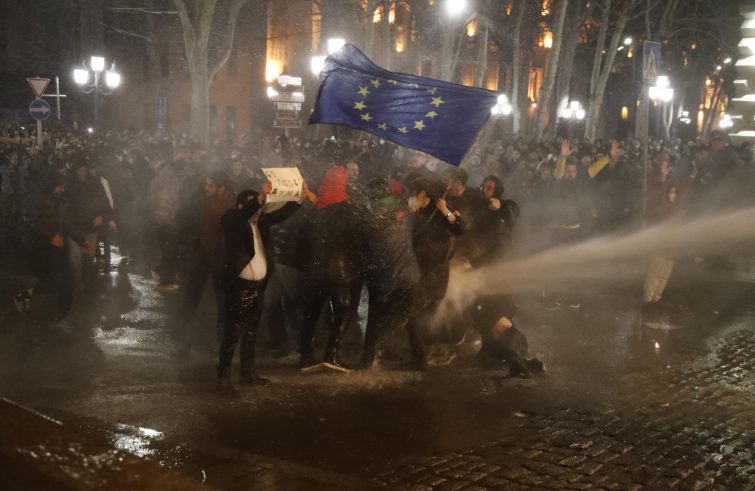
A divided country. On the one hand, the young, who are on the pro-European camp. While the older generation, fearing the loss of its traditional values, turns its gaze towards Russia. People in Tiblisi are taking to the streets again. Monsignor Giuseppe Pasotto, Apostolic Administrator of the Latin Catholics in the Caucasus, describes to SIR the current situation in Georgia. “Today is a strange day”, he says. “Since early morning, before the second important meeting convened for this evening in response to last Sunday’s youth demonstrations, some roads in the city have been closed.” Reports of the second reading of the controversial ‘foreign agents’ law reached the protesters after tens of thousands of people marched on Sunday night waving EU flags. The governing Georgian Dream party, which pushed for the law, has been accused by its opponents of trying to bring the country closer to Russia by passing a law similar to the one in force in Moscow, which has allowed many critical and dissenting voices to be silenced. Unfortunately, moments of tension flared up. Police fired tear gas to disperse the crowd after some activists broke through security barriers outside the parliament building. The bill – passed after a heated debate in the parliament’s Justice Committee – requires groups, organisations, media outlets and other entities that receive more than 20% of their funding from outside Georgia to register as “foreign influence agents”. The final reading of the bill is scheduled for 17 May.
EU flags were seen waving in the streets and it was the young people who were raising them. Do they have reason to fear that the law will slow down Georgia’s progress towards the European Union?
It will not just slow it down. They say it will actually prevent EU accession. Brussels has already warned that passing such a law could destroy Georgia’s chances of joining the EU.
That’s why we stand at a crossroads: it’s either the road to Europe or the road to Russia.
These are two very different views of the future. Even the government claims to want to join Europe, but it also says that we want to join with our own values and not be bossed around by others. On the other hand, young people are protesting because they perceive a closure and a change of direction compared to what was decided some time ago in a referendum that saw 87 per cent vote in favour of Europe.
Is the country divided?
It is, when I watched the street demonstrations I had the impression that the country was breaking into two parts, two distinct mindsets. This should be a time of unity, of walking together, but it is a time of difficulty and division instead. Today, as I watched the television coverage of the street protests, I prayed that nothing serious will happen. The young people are saying that they want everything to happen with a peaceful approach.
Are you worried that the situation might spiral out of control?
I don’t think that’s the case at the moment. Still, something could happen that might change everything. One of the things I am afraid of is provocations that trigger repression and confrontation.
Is the Church among the organisations receiving foreign funds? Are you concerned?
Yes, we are. The law classifies all organisations, including Caritas, that receive more than 20 per cent of their funding for activities and projects from abroad as “foreign agents of influence.” What does that mean? We obviously have nothing to hide, so nothing changes for us. However, in practical terms it means a lot of extra work. There was no need for this, because everything is already done in full transparency. All income documentation must be submitted. Also, this law might be changed in the future and we don’t know in which way. That’s a problem. So at the moment it’s mostly a symbolic decision, but the symbolism is very dangerous.
What is your message to the young people involved in the protests?
I want Georgians to understand that right now it’s important to unite rather than divide the country, to rediscover together the common values that are part and parcel of this country’s history and culture. Family values, for example, are important values that we must protect, but we must not assume that they will be lost just because we are joining Europe. There is a fear that Europe will impose a culture that is alien to the tradition of this people. Georgia must therefore learn to value Europe as a friend and neighbour. But this transition requires patience.









